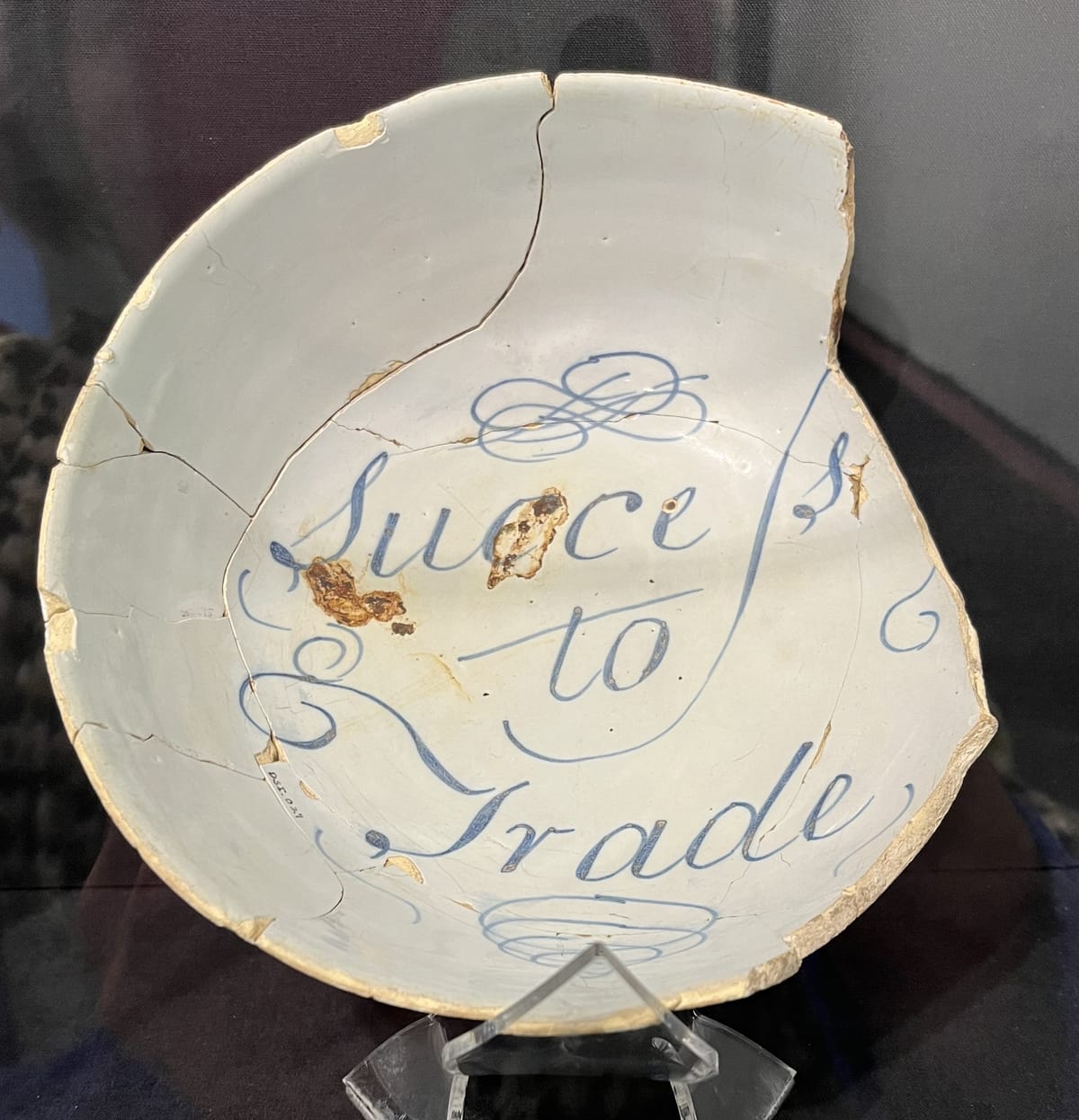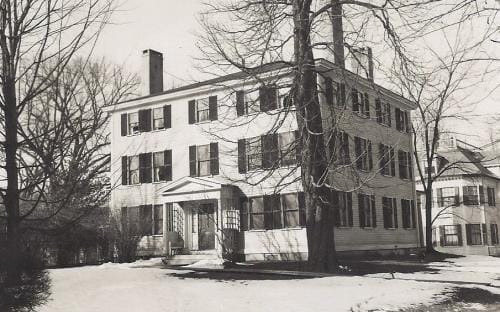Success to Blog

I may not be a trained researcher, but I've picked up a few tricks while working on my weekly blog. I've received many comments from you all about how interesting the information is, and I appreciate that. When I mentioned this to my son-in-law, he suggested I write a blog about how I write my blog. So, here I am!
Have you ever heard the term "everything is dumbed down"? I always strive for accuracy, and sometimes I find myself chasing down details, even if it's just for a single paragraph. This recently happened when I was looking for information on 18th-century pottery, like early Wedgwood. I was surprised at how challenging it was to find detailed information. I turned to Google and Wikipedia, only to encounter vague descriptions that left me with more questions than answers. Why is that? Are we too busy to learn or care, or have we stopped asking questions altogether?
Then it hit me – many of you share an interest in history, judging by the number of clicks on my weekly blog entries. Deeper history, beyond our high school history class, is both meaningful and fascinating. However, it's often difficult to uncover. So, my aim is to assist you in finding those answers. Perhaps you can find the solution to your lingering questions, much like the ones that continue to plague me. I still have a few I'm working on.
Now, what's the key to finding answers?
I kick off each issue with a question. I could simply present historical facts, but that would be dull. The story needs context, so each issue revolves around one or more questions that I ask myself. Sometimes the question arises during the research, like with Locke Tavern, while other times, I have the question before I even start, as was the case with "Rum and the Revolution."

Locke Tavern initially wasn't a story I planned to cover. However, as I delved into the research, I realized that the Temperance Movement was gaining traction in the late 1830s, and the railroad was impacting many taverns reliant on stagecoach revenue. My question evolved into, "Who could survive this time period, and what made them different?" Locke Tavern emerged as the only tavern that effectively answered my questions, sparking the beginning of a new story.
For 'Rum and the Revolution,' the question was clear from the start: "Was rum the root cause of the Revolution?" I concluded that between alcoholism and an economy built around the rum trade, rum played a significant role in igniting the Revolution. In both cases, the story was crafted to provide you, the reader, with answers to these questions.
Research
Like most historical researchers, I utilize a variety of sources for my work – my personal library, digital resources, and one paid site (Ancestry.com). Let's delve into each one.
Ancestry.com – Ancestry is an excellent platform for delving into the lives of individuals, their families, and their life histories. Through this site, I can explore online Massachusetts and Essex County real estate and probate records dating back to the 1600s. It also provides access to wills, births, and marriage records in their original form (though some can be challenging to decipher). Fortunately, many are available in copied and printed formats. Additionally, numerous families have compiled books on their genealogy, proving invaluable when unraveling intricate relationships. A word of caution: while members may post family trees for public viewing, they may not always be 100% accurate. Nevertheless, they offer a helpful visualization of family relationships and timelines. I consistently search for original documents, such as birth records and marriages, and cross-reference them with member entries.
Online History Centers – These centers offer a treasure trove of documents and pictures, many of which can be used with acknowledgment to the respective groups. Always remember to ask for permission! Both the Andover Center for History and Culture and Andover Historic Preservation have fantastic websites filled with countless stories and pictures that I frequently rely on. However, they are not the sole providers; almost every museum or history center offers a combination of online and physical materials for researchers. The Massachusetts Historical Society and Boston’s Public Library are other notable resources. It's essential to note that not every historical center has an online presence, and not all of their history is available online. For instance, the Andover Center History and Culture archives revealed an Andover merchant’s ship logs detailing the delivery of rum and other items to Salem, MA, from Martinique, providing evidence of New England ships bypassing the British colony of Barbados. This local delivery of a substantial amount of rum was one reason I chose to focus on Andover's history due to the abundance of documents in their archives, allowing for more detailed research. Unfortunately, not every town is as fortunate in this regard.

Old books - Let's talk about my love for old books. Whenever I stumble upon a new source, the first thing I do is check its references. I have a soft spot for books from the past, especially those published before 1940 and, ideally, from the 1800s. Why, you ask? Well, the authors often have a personal memory of the history they're writing about or have had the chance to interview someone with firsthand knowledge. Now, here's the catch with old books—they assume people are interested in reading, and sometimes, they're not shy about sharing their biases. Nevertheless, they're goldmines of information, offering intricate details about events, measurements, or quoting obscure newspaper articles or individuals that can be a real challenge to find elsewhere.
Take, for instance, my recent quest for information on the various types of plates, mugs, and pitchers used in a tavern. I was curious about the differences in pearlware, creamware, and redware and what these choices said about the owner. Modern sources left me wanting, but then I stumbled upon an old book from the 1940s. A quick online search led me to a free copy, and lo and behold, it had the detailed information I was looking for on the physical properties of earthenware, the inventors of each type, and how long they were in production. Once again, old books came through!
Now, let's talk about finding books online without breaking the bank. Before you reach for your wallet on Amazon, consider these three sources of FREE books that I frequently use:
Books online: Looking for books online without breaking the bank? Before reaching into your pocket on Amazon, check out these three fantastic sources of FREE books that I frequently rely on. Here's my go-to playbook:
Internet Archive: My first stop is always Google, armed with a list of libraries that might have the book. Look for Internet Archive, a non-profit library boasting millions of free books, movies, software, music, websites, and more. What's remarkable about this site is its search engine, which scans through the entire book to pinpoint your topic. I recently searched for "rum" in a book, and it showed up seven times, neatly listed with a fast-forward carrot to zip to each page. Best part? You can download the book and read it at your own pace.
JSTOR: It's a gem! I access this incredible resource with my Boston Public Library card, a free perk for all Massachusetts residents. Many libraries nationwide also offer free services. JSTOR, a not-for-profit service, assists scholars, researchers, and students in discovering, using, and building upon a vast range of content in a trusted digital archive. With over 12 million ebooks, journals, images, and primary sources, JSTOR focuses on technology tools to make scholarly exploration a breeze. They do have a checkout and download limit, but I've never come close to hitting it. I'm a huge fan of their lightning-fast search engine.
Boston Public Library: Brace yourself for an unbelievable source of information, especially rare manuscripts, pictures, and maps. Thanks to Norman B. Leventhal's generous map collection donation, the Norman B. Leventhal Map & Education Center offers a treasure trove of old maps online. The library houses rare books, including John Adams' personal library (1735-1826), and all of Boston Town records. Here's a nugget – the Boston Public Library has been digitizing its extensive manuscripts using Internet Archive. My recent discovery? A business log from 1750 of a Boston distiller making New England Rum. You never know what hidden gems you'll find!
Library of Congress: I only recently started to use the Library of Congress. It is another stellar source with a top-notch search engine. The sheer volume of items might be overwhelming but consider it a last resort – if anyone's got it, they will. Plus, they're super user-friendly when it comes to copyrights. Clear explanations and availability tags make navigating their treasure trove a breeze.
So, there you have it – my little secret stash of free online book havens. Happy reading, and you never know what exciting discoveries await you!
Bringing it all together
Growing up, my supper table was surrounded by stories and laughter. I like to believe I can tell a good story, but I'll admit, I'm not a wordsmith. I lacked proper grammar and sentence structure. That's where I needed an editor, and that's where ChatGPT stepped in.
Now, I know there's a lot of debate around the use of AI tools, and I get it. I agree that using AI to create content from scratch is cheating – not my style. However, when it comes to having an editor, that's a different story. Editors have been a crucial part of the writing process for centuries, evolving and becoming more sophisticated over time. I've chosen to embrace AI as an editor, and I believe it's today's most advanced free tool. (I mean, why buy something when you can get it for free, right?)

Lessons I've Learned Using ChatGPT
First and foremost, ChatGPT is a breeze to pick up. I spent around 20 minutes on the tutorial, and just like that, I was good to go. My main goal was to correct grammar, and for that, it was a piece of cake to learn. While I'm aware there are more advanced uses that might take longer to grasp, this was all I needed – at least for now.
My approach involves loading sections for ChatGPT to review. This helps me stay focused on the content, and it turns out, ChatGPT has a limit on the length it will review. I guess they're not keen on editing entire books, but my method rarely hits that limit. After receiving the grammar checks or rewrites, I go through them and compare against the original content to ensure nothing significant has changed. One common thing I catch is modified quotations that need to be reverted to my original text.
One surprising lesson from ChatGPT: for the first time in my life, I'm enjoying writing. I used to despise it. I never fully grasped all the grammar rules, and they often hindered my storytelling. Plus, I was always embarrassed by my mistakes, with others quick to point them out. In the days of secretaries, I was lucky to have English majors help me, but when they vanished, I was in trouble. Now, with correct grammar, my stories are coming to life, and to top it off, a few of you actually like them. Thanks for the encouraging words!
Next Steps
Crafting each blog entry consumes around eight hours, covering everything from formulating questions, writing, editing, to formatting with pictures. Research, however, varies in time as I often find myself captivated by new and fascinating topics – the joy of continuous learning. My next venture involves marketing my blog, using platforms like Instagram to invite others into the blogosphere. (Feel free to spread the word about my site if you enjoy it, as everyone is welcome!). The ultimate dream? Transforming this material into a book – something I once found too daunting. Thanks to this blog and your invaluable feedback, I'm gaining the courage to take that leap forward.
I never thought writing could be enjoyable, and I owe a lot of this positive change to your unwavering support and my son-in-law who gave me a Christmas present of setting up a blog. Thank you for being a part of this journey, and I hope you find the answers you seek!
Sources
Andover Center for History and Culture, on-line and on-site research. Recommend you call ahead if you are a first timer. https://www.andoverhistorical.org/.
Andover Historic Preservation Site, write-ups and photos, Welcome to the Andover Historic Preservation Web Site | Andover Historic Preservation (mhl.org).
Boston Public Library, https://www.bpl.org/
ChatGPT, https://openai.com/blog/chatgpt
Internet Archive, https://archive.org/
JSTOR is available through your library log-in at https://www.jstor.org/
Library of Congress, https://www.loc.gov/
Comments ()